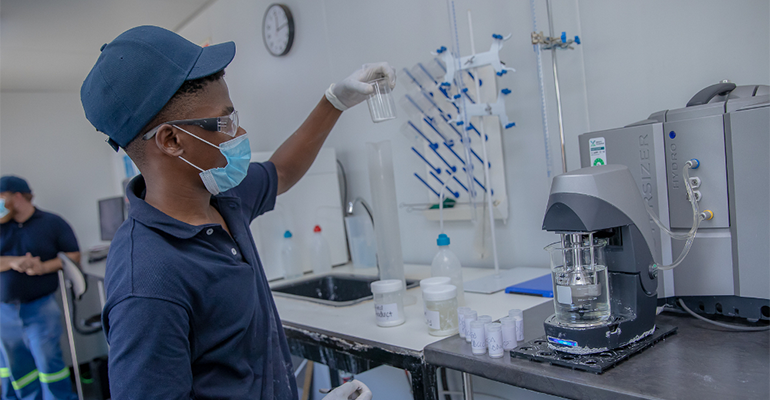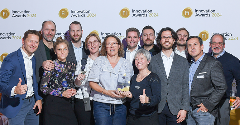News
Nestlé launches ‘molecular recycling’ initiative
16 Aug 2022
Food and beverage giant Nestlé introduces Infrasalience, a molecular recycling project in Africa that converts carbon emissions into water and food-grade bicarbonate of soda.
In partnership with the emissions capture and waste management platform, Emissions Capture Company (ECCO), Nestlé’s production site in South Africa, Babelegi Industrial Park, has adopted a technology called WhiteBox to help the company recycle carbon.
The technology is designed to significantly reduce carbon dioxide (CO2) emissions while recycling industrial wastewater and turning it into chemicals for sustainable production.

As part of this molecular recycling initiative, called project Infrasalience, Nestlé captures carbon emissions using industrial wastewater from its plants to produce a green product in the form of sodium bicarbonate, better known as baking soda.
Developing molecular recycling technology
WhiteBox technology uses machine learning to analyse data that measures emissions from the site’s production process. “This analysis is key in the mechanics of converting the flue gas and recycled wastewater into green chemicals, namely, sodium bicarbonate or baking soda,” says Saint-Francis Tohlang, corporate communications and public affairs director at Nestlé East and Southern Africa Region (ESAR).
While the technology belongs to ECCO, the sustainable sodium bicarbonate that is produced has been third-party verified as having a carbon footprint of up to 22 times lower than the incumbent product, Tohlang says. Green chemistry also plays a crucial role and centres on how the company can use less hazardous ways to produce, recycle and apply circular economy principles.
Creating a way forward for carbon conversion
Data collected from the industrial scale pilot, paired with machine learning techniques, shows the company can calibrate the WhiteBox technology to capture between 25% to 70% of Scope 1 CO2 emissions, according to Tohlang, and recycle available industrial wastewater at a site.
“This is achieved through carbon capture from the hosts’ emissions and energy-efficient gas processing, using low-fuel consumption methods,” says Tohlang.
The industrial facility is also expected to recycle around 70,000 cubic metres of water each year. The amount is equivalent to approximately 1.4 million cubic metres of water across the project’s lifetime, projected to be 20 years, or the equivalent of annual drinking water for about 158,000 people.
Companies that use sodium bicarbonate can purchase ECCO’s ingredient to reduce their Scope 3 emissions and lower the environmental impact of their food products that use sodium bicarbonate as an ingredient.
While Scope 3 emissions are indirectly associated with a company, it is responsible for these up and down its value chain. These emissions relate to all interactions with the organisation and its operations, including buying products from suppliers and customers’ product use.
Increasing sustainable food production in Africa
Nestlé says it is aiming to tackle climate change through food manufacturing. “Through our regeneration sustainability promise, we ascribe to a regenerative food system by supporting improved and diversified farmer incomes through sustainability programmes,” says Tohlang.
In a television interview with eNews Channel Africa (eNCA), Nestlé’s Tohlang talks about how initiatives like its molecular recycling project and its wider sustainability ethos can help to improve food security and address climate change.
The company’s latest project forms part of its sustainability strategy, Nestlé’s RE: reduce, recycle and repurpose. The RE initiative aims to help mitigate sustainability challenges and strengthen its contribution to a circular economy.
Related news

Oat Barista: Innovation for game-changing beverages
20 Nov 2025
Oat Barista is a clean label, sustainable, and innovative drink base specifically designed to create the perfect foam in one single ingredient.
Read more
Nitrites: Pressure grows on UK to follow EU’s lead
20 Nov 2025
Pressure is growing on the UK to follow the EU’s lead after the bloc revised its regulations on the permitted levels of nitrites and nitrates in cured meats.
Read more
Empowering innovation in fortification and colouration
13 Nov 2025
Divi’s Nutraceuticals offers a large portfolio of innovative, high-quality ingredients for foods, beverages, and supplements, with bespoke solutions and expert support for product success.
Read more
Danone highlights digestive health as potential ‘tipping point’ for food industry
13 Nov 2025
Danone is betting on a food industry “tipping point” that will bloat the market for healthy products, particularly those related to gut health.
Read more
Standing Ovation and Bel scale up casein production from dairy co-products
11 Nov 2025
Foodtech company Standing Ovation has partnered with cheese specialist Bel Group to manufacture dairy serums for industrial-scale casein production via precision fermentation.
Read more
AI attraction means foodtech startups must ‘prove’ rather than ‘promise’
4 Nov 2025
Reports suggest that artificial intelligence (AI) is sucking investment from foodtech and agritech, but investors say the picture is complicated.
Read more
Will postbiotics become the go-to functional ingredient?
3 Nov 2025
Postbiotics show significant promise for the functional foods market due to their safety profile and beneficial bioactive properties, research suggests.
Read more
Meet the finalists of the Fi Europe Innovation Awards 2025
31 Oct 2025
Who made it to the shortlist of the Fi Europe Innovation Awards 2025? Read about the 23 companies making food and drink products healthier and manufacturing processes more efficient.
Read more
Penguin and Club bars no longer classed as chocolate
30 Oct 2025
Penguin and Club bars can no longer be classified as chocolate after the pladis-owned McVitie’s brands turned to cheaper alternatives amid the ongoing cocoa crisis.
Read more
Shorter drying time, sweeter success!
30 Oct 2025
Curious about cost-effective, sustainable and delicious candy making? Stefan Wessel reveals how Avebe’s solutions reduce drying time and energy use by up to 50%.
Read more